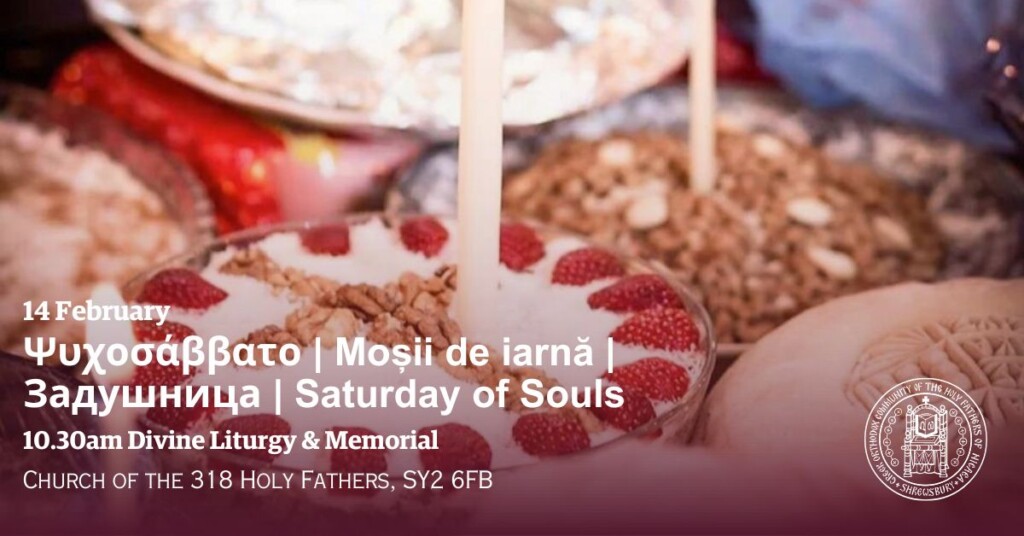
On 14 February, at 10.30am, there will be a Divine Liturgy and Memorial service for Ψυχοσάββατο – Moșii de iarnă – Задушница – Saturday of Souls at the Church of the 318 Holy Fathers.
In the Orthodox Church, there is an important and long-standing tradition of praying for our departed sisters and brothers. Saturday (except for Lazarus Saturday and Holy Saturday) is the day of the week that the Orthodox Church traditionally reserved for those who have fallen asleep because our Lord’s own salvific passing took place on Great and Holy Saturday.
While each Saturday provides an opportunity to remember those who have fallen asleep, there are two main Saturdays every year known as ‘Saturday of Souls’, which are set apart for this purpose: the Saturday before Meatfare Sunday and the Saturday before Pentecost.
On the Saturday of Souls, Orthodox Christians commemorate those who have fallen asleep, beginning with Adam and Eve and ending with the most recently departed souls. With reverence, we ask God to forgive all their transgressions and grant them rest “in a place of green pasture.” In addition to expressly commemorating the names of our loved ones, our prayers include, more generally, all those who have fallen asleep in the hope of the Resurrection of Christ.
For the Orthodox Christian faith, the most important aspect of our continued relationship with those who have fallen asleep occurs not at the cemetery but at the church during the Divine Liturgy. When we conduct the Liturgy and enter into the foretaste of the Kingdom of God, everyone and everything takes their rightful place. No one is forgotten. No one remains nameless. No one is left behind. When we receive Holy Communion, the visible and the invisible world is mystically united in Christ.
The Divine Liturgy is the ultimate place of encounter and communion with all of God’s creation, with all those present and those not present, including all those who have fallen asleep. The soul of every human being is immortal. And every member of the Church who falls asleep in the Lord remains part of the Church — they remain alive in Christ. In every Liturgy, the faithful offer bread and wine, and Christ offers Himself — His Body and Blood — for life eternal.
At the end of the Liturgy, we commemorate our reposed family members and pray for their souls and their memory to be eternal. The Church, established by Christ Himself and the Holy Spirit, has an eschatological dimension. Everything we pray for or liturgically carry out in the Church is related to the Second Coming of Christ and the final establishment of His Kingdom. When we pray for their memory to be eternal, we refer to our belief that even if we buried the bodies of the departed in the earth, their souls remain eternal. And at the Final Judgment, they will be resurrected as new incorrupt bodies and souls and live eternally united with Christ in His Kingdom. In addition, the Church’s memory is eternal and everlasting. The Church never forgets those who have fallen asleep and maintains them in liturgical and eucharistic memory. We ask God to remember them in His Kingdom, and we, as the Church, repeatedly confirm that we do not forget them.
In addition to bread (prosphora) and wine, the faithful offer olive oil for the Church’s vigil lamps, which are lit as a reminder of God’s benevolence. The faithful also offer kollyva.
On the Saturday of Souls and other similar occasions, the faithful offer kollyva. Kollyva is a sweet offering made primarily from wheat and includes raisins, nuts, pomegranate, cinnamon, and icing sugar. It is often formed in the shape of a mound to resemble a grave and decorated with the sign of a cross.
Each family brings a prayerfully prepared kollyva dish on the Saturday of Souls and places it in front of the icon of our Lord. Candles are lit and inserted in the kollyva dish. Toward the end of the Liturgy, the service with the special memorial hymns and supplications is chanted. The priest calls out the names of those who have fallen asleep. Everyone then chants together, “Memory eternal.” After the service, the faithful distribute kollyva, and then family and friends visit the gravesite of their beloved who have fallen asleep. If a priest is present, it is customary for him to conduct a Trisagion service and also pour some kollyva (and wine, depending on the custom) on the gravesite.
Kollyva is an image of the Resurrection. The wheat, planted in the earth and grows into something new, symbolises those who have passed on in the expectation of revival. As the Apostle Paul explains: “So also is the resurrection of the dead. The body is sown in corruption, it is raised in corruption. It is sown in dishonour; it is raised in glory. It is sown in weakness; it is raised in power. It is sown a natural body; it is raised a spiritual body” (1 Corinthians 15:42-44).
Memory eternal!